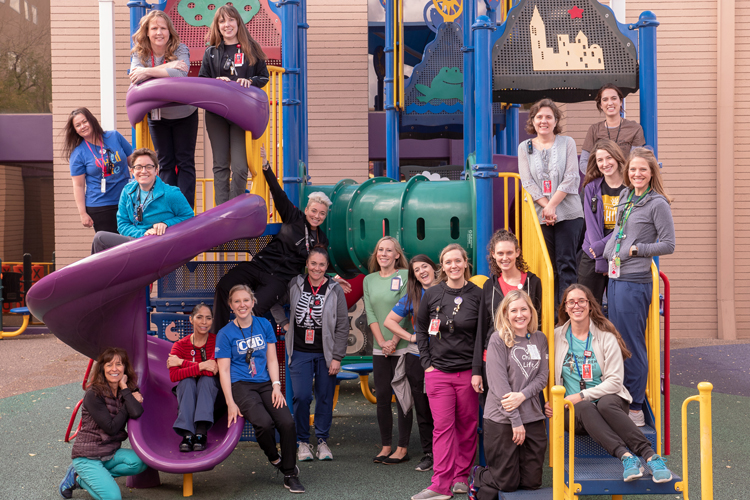Imagine you’re 6 years old. After a terrifying accident, you were pried from a car, whisked into an ambulance and rushed to the trauma center at Phoenix Children’s Hospital. Your parents were taken to a different hospital for adults. You’re not even sure where they are. All you can see are glaring lights and the faces of people you don’t know. Doctors are urgently giving orders. Nurses are putting a mask over your face and needles in your arm. You can‘t breathe; you’re disoriented, and no one knows your name yet. Your tears spill over and you begin to panic.
Then, a Child Life specialist enters the room. Everything changes.
She holds your hand; she gets very close to your face and looks directly into your eyes. She whispers, “Hi. My name is Nicole. I love dogs and my favorite color is green. These doctors and nurses are trying to take good care of you. And I’m here to help you through this until your mom gets here.”
She takes a moment to explain exactly what’s happening you. She asks which arm you’d rather the nurse place your IV into. She places a soft, plush animal underneath the oxygen tube. Your small body relaxes. Your heart rate decreases. Now, the doctors and nurses can get to the urgent task of helping you get better.
Child Life specialists bring patience for patients
March is Child Life month, and you may wonder, what does a Child Life Specialist do? Physicians and nurses are responsible for patient’s clinical care. Social workers lend support and resources for parents, grandparents, guardians and relatives. But Child Life Specialists are dedicated solely to patients and their families.
“We speak the language of children,” says Nicole Mack, a Child Life Specialist serving on the Pediatric Intensive Care Unit (PICU) at Phoenix Children’s. Today she’s celebrating, “Bowtie Tuesday,” she says. It’s her way to honor the memory of a patient who lost his battle a few years before. “I do this work for the kids,” she says. “There is nothing more gratifying then seeing the smile of a child after they’ve overcome something traumatic.”
Child Life Specialists make a children’s hospital unique. Adults have the coping mechanisms to process what’s happening to them so they can mentally prepare for treatment. But children need guidance and advocacy to develop the trust necessary to take on surgeries, treatments, and heal.
“Adults understand what’s happening to them at the Hospital,” says Nicole. “Children don’t. They are used to their routines at school and home, and the Hospital can be an overwhelming place.” Jenni Rogers, Manager of Child Life Services at Phoenix Children’s, says she and her colleagues are, “Child development experts who use play as a way of helping children and teens understand what to expect and how to cope with being hospitalized. This includes explaining procedures or a new diagnosis using developmentally appropriate language or teaching tools. Child Life Specialists also use play as a way for hospitalized children and teens to share their emotions, create memories during a difficult time, become more comfortable with medical equipment, or just have fun!”
It’s true, part of Child Life is play, fun and distraction which makes the Hospital a less scary place. But these serious professionals work hard to achieve and maintain their credentials and skills. “All Certified Child Life Specialists are required to have a minimum of a Bachelor’s degree in Child and Family Development, Therapeutic Recreation or a related field. Many of the staff at Phoenix Children’s are Masters’ prepared as well, and complete a minimum of 100 hours in a Child Life Practicum program, and a minimum of 600 hours in a Child Life Internship program before passing the national certification exam,” says Jenni.
She explains that the presence of Child Life Specialists are helpful to multidisciplinary care teams. “Each team member brings their expertise alongside the family to develop the best plan of care possible. While the medical needs of the child come first, child life works to ensure that life remains as normal as possible and kids can still be kids, even when they are hospitalized.”
Nicole says Child Life Specialists bring a range of personalities and assets to the task. A sense of playfulness helps, as she shows a video of herself “driving” a mini tesla and playing music to encourage a patient recovering from a spinal cord injury to follow her down the hallway with her IV pole, too. It’s a careful blend; Child Life Specialists must understand medical and biological vernacular, but easily switch to communicating on a child’s level, to understand their struggles, and to use developmentally appropriate interventions. And also bring the fortitude to cope with those really hard days.
“A Day in the Life” of Child Life
Nicole threads in and out of patients’ rooms in the Pediatric Intensive Care Unit (PICU). She makes connections with each patient, sibling, parent, doctor and nurse in her path. She knows all of their names and what each one needs at the moment. She cheerfully whispers to a little boy in a coma, a victim of abuse. She says despite his stillness, he can hear every word she says, so she wants her voice to be a positive one. You might wonder if it’s hard — caring for children who are critically ill, or perhaps nearing the end of life, or who are maltreated.
And it can be she says, but Child Life Specialists are trained to cope with difficult situations, like when a child passes away. She says her training helps her to be very present, to be a source of comfort and advocacy for patients and families reeling from devastating news. Then, it’s up to her to cope with the feelings that inevitably arise out of the empathy necessary for her role.
“I come back and I try to find something to make me smile; we’re all a big team here, and we help each other. You have to take care of yourself. For me, I find a rock; I put all my energy and love for that child and their family into that rock and place it outside. I love spending time in nature, too, to recharge.”
“For those hours, I can be part of a family’s difficult journey, and I always thank them for allowing me to be a part of that moment with them,” she says.
The Child Life Program at Phoenix Children’s Hospital is supported 100% through the community generosity. Visit here to make a donation and celebrate Child Life Month: phoenixchildrensfoundation.org




